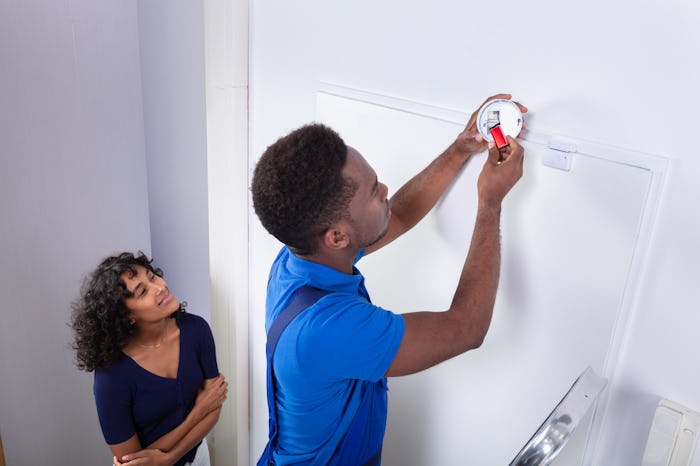Life

This Is How Many Smoke Detectors You Need In Your Home To Be Safe
Fire safety is something that's easy to overlook for many busy families, but it couldn't be more important. If you're looking to improve your home's safety rating, one of the first questions you may have is: How many smoke detectors do you need in your home?
When it comes to installing fire alarms in your home, "the general rule is that you should have at least one smoke detector on each floor of your home" which should be placed outside of sleeping areas ideally, as Chuck Roydhouse tells Romper. (A retired professional firefighter, Roydhouse is the President of the Chimney Safety Institute of America, and the owner of Clean Sweep of Anne Arundel County.) While some smoke detectors may only require a battery, Roydhouse says it's recommended to have one that's hardwired and to include a battery as backup. It's also important to make sure you're getting a quality alarm, as Steve Kerber, Vice President of Research for Underwriters Laboratories and director of the UL Firefighter Safety Research Institute (FSRI), tells Romper.
"When replacing or buying new smoke alarms, look for products that are third-party listed or certified," Kerber says. In case a fire breaks out in your home, you'll want to be warned by an alarm so you can get your family out as quickly as possible.
Of course, a smoke alarm is no good if it's not working, so just installing them and forgetting they exist isn't the safest thing either. "Smoke alarms should be tested once a month by pushing the test button," Kerber explains.
Many of us feel the need to disable our smoke alarms when it goes off while we're cooking (I'm totally guilty of this). The danger here is that people often forget to reactivate them. If you're wondering if you even really need smoke alarms anyway, the answer is yes.
"Today, fire [spreads] faster due to synthetic fabrics in furniture, lighter construction materials and open floor plans, leaving people three minutes or less to escape," says Kerber. Having smoke alarms installed correctly throughout your home may save lives.
What about carbon monoxide detectors? Yup, you need those too. Be sure to install them in the "central locations of the home," says Roydhouse. Carbon monoxide is especially dangerous because unlike smoke, you won't know if you have carbon monoxide in your home unless the detector alerts you. Carbon monoxide is a "deadly gas that can come from appliances like a furnace, clothes dryer, oven or water heater if it is not working properly," explains Kerber. And, as Roydhouse adds, carbon monoxide is especially dangerous because it's "colorless, odorless and tasteless, so without a carbon monoxide detector, you won’t know there’s a problem."
Both experts suggest coming up with a family emergency safety plan, which should include "an agreed upon location where everyone will meet once they're safely out of the home." You can make this your neighbor's house, a light post, a familiar tree or any object that stands out and is a safe enough distance from your home. You should also make sure everyone in your family is aware of multiple different escape routes. In case some of the common exits are obstructed, finding other ways out can be critical. "These may be upstairs windows, so depending on the height of your home, you may want to invest in emergency ladders," explains Roydhouse. Kerber adds, "A fire escape plan is incredibly important for families. Not only to make one, but to practice it at least two times a year." He suggests "[drawing] a map of each level of the home. Show all doors and windows. Go to each room and point to the two ways out."
Once you install all your working smoke alarms, carbon monoxide detectors and create your family emergency exit plan, you're in good shape... but there is one more thing you may want to add to your home.
"It’s a good idea to keep 15 lb. ABC fire extinguishers in multiple locations throughout your home — like in the kitchen, in a hall closet, and in the corner of a family room," says Roydhouse.
That way if a fire does start in your home, you may be able to put it out before it spreads.
Making sure your home is up-to-date with it's emergency safety plans can seem like a hassle at first, but keeping your family safe is well worth the extra effort. Don't forget to teach your kids to call 9-1-1 in case of an emergency and go over your home address and important phone numbers to make sure everyone knows all the important information. You'll be glad you did.
This article was originally published on